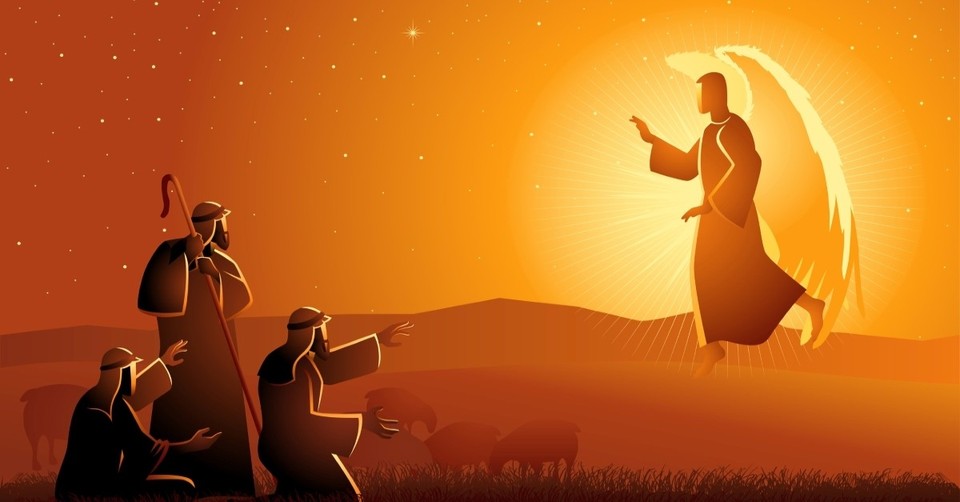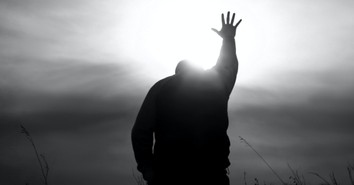Why Do the Christmas Angels Appear to Shepherds?

The birth of Jesus was a most miraculous event, having been foretold centuries before. And such a momentous event deserved a grand announcement. Of all the people who would first be told, why do the angels first appear to shepherds to announce Jesus’ birth?
Michael and Stormie Omartian wrote and staged a musical titled Child of the Promise. The story follows the narrative of the prophecies and birth of Jesus the Messiah. Various artists sang the roles of Jeremiah, Isaiah, Joseph, Mary, and others as told in the Bible. The shepherds in the field near Bethlehem, too, had a role. Their song was comic in that it spoke of how they were the lowest of the low and their lives would never reach the status of shepherd David killing Goliath. Then an angel appeared in holy splendor along with a heavenly host and stunned the shepherds to silence.
The Bible gives us great insight into why God chose to make His announcement of “cosmic significance” to a bunch of lowly shepherds.
What Was the Role and Status of Shepherds in the First Century?
Shepherds lived difficult, almost nomadic lifestyles at the time of Jesus. Overseeing flocks which likely consisted of both sheep and goats, those dusty hard-working men were accountable for their flocks. Night was never a time for uninterrupted sleep, as shepherds had to place their charges into sheepfolds and protect them from predators and robbers. Each sheep was counted every morning and should one have gone missing, the shepherd searched diligently for his lost charge.
Shepherds were given license to allow their flocks to feed in fields near villages. Often, some of their sheep were used as sacrifices at the temple in Jerusalem, so special care was in order. Sheep and goats were also used for their thick wool and for meat.
Though the patriarchs were respected shepherds, those in the first century did not enjoy anything but a low status within their culture. They shared the same social stratum as tax collectors and dung sweepers. In the time of the patriarchs, shepherds enjoyed being in an honorable occupation because at that time, pretty much all were living nomadic lives. But with the advent of greater population and hubs of society, a “homeless” shepherd lacked social stability, something culture chose to value.
Randy Alcorn tells us, “Smug religious leaders maintained a strict caste system at the expense of shepherds and other common folk. Shepherds were officially labeled ‘sinners’ — a technical term for a class of despised people.”
Where Does the Bible Tell Us about the Angels Appearing to the Shepherds?
Luke’s is the only Gospel account which mentions the shepherds. The narrative is written in Luke 2:8-20,
“And in the same region there were shepherds out in the field, keeping watch over their flock by night. And an angel of the Lord appeared to them, and the glory of the Lord shone around them, and they were filled with great fear. And the angel said to them, ‘Fear not, for behold, I bring you good news of great joy that will be for all the people. For unto you is born this day in the city of David a Savior, who is Christ the Lord. And this will be a sign for you: you will find a baby wrapped in swaddling cloths and lying in a manger. And suddenly there was with the angel a multitude of the heavenly host praising God and saying, “’Glory to God in the highest, and on earth peace among those with whom he is pleased!’ When the angels went away from them into heaven, the shepherds said to one another, ‘Let us go over to Bethlehem and see this thing that has happened, which the Lord has made known to us.’ And they went with haste and found Mary and Joseph, and the baby lying in a manger. And when they saw it, they made known the saying that had been told them concerning this child. And all who heard it wondered at what the shepherds told them. But Mary treasured up all these things, pondering them in her heart. And the shepherds returned, glorifying and praising God for all they had heard and seen, as it had been told them.”
Why Are Shepherds the First to Hear of Jesus’ Birth?
God has a reason for everything He does, and sometimes it takes a little research to discover the why of His actions. But times exist where God is not clear about His ways. We accept that with joy because God is sovereign, and the Bible tells us, “For My thoughts are not your thoughts, neither are your ways My ways, declares the LORD” (Isaiah 55:8).
God is not explicit in His Word about why the shepherds were the first to receive the announcement of Jesus’ birth, but with a little digging we can find some possibilities.
5 Possible Reasons the Angels Appeared to the Shepherds
To salve our curiosity and consciences, let’s relate the angel’s appearance to the shepherds to our Lord Jesus.
1. Lowly
When Jesus again spoke to the crowds who followed Him, He revealed more of His human condition, “Come to me, all who labor and are heavy laden, and I will give you rest. Take My yoke upon you, and learn from Me, for I am gentle and lowly in heart, and you will find rest for your souls. For My yoke is easy, and my burden is light” (Matthew 11:28-30).
If anyone in that culture understood a lowly state, the shepherds did. Their estate was one of subservience and humility. Jesus arrived on this earth in the form of a helpless baby, and, while raised in the household of a craftsman, His position was not regal and mighty as the Jews expected.
2. Shepherds
The major biblical patriarchs were Moses, Abraham, Isaac, Jacob, and David. Each of these men were shepherds for a time of their lives, albeit their occupation was more noble when they served as such. King David called the Lord his shepherd (Psalm 23:1), and Jesus called Himself the good Shepherd (John 10:11, 14).
3. Sheep
The shepherd motif is a broad one throughout Scripture. Isaiah 53:6 reminds us, “All we like sheep have gone astray; we have turned — every one — to his own way; and the LORD has laid on Him the iniquity of us all.” Isaiah is speaking of Jesus Christ as the One on whom God has laid the iniquity of us all.
Of course, the One who watches over us and keeps us in His safety is the Lord Jesus Christ. He, our chief Shepherd laid His life down for His sheep (1 Peter 5:4). He is the ultimate sacrificial Lamb. We who have surrendered to Jesus in repentance and faith are His sheep.
4. Watchful
The shepherds in the field outside Bethlehem were awake and watchful. When the angel appeared in the night sky, they reacted with great fear, and then belief. They did not doubt what the Lord had shown to them. Their demeanor serves as a contrast to the Jews who watched for a mighty king to save them from the yoke of the Romans. The evidence was clear; they chose to reject it. As Pastor Don Stewart says, “Though the people went through the proper rituals that God had commanded, their hearts were not in them. They were not that interested in the truth of God.”
5. Proclamation
Jesus proclaimed the kingdom while He was on the earth (Mark 1:14; Luke 4:43). Once the shepherds saw the baby, they told people what the angel said to them. And they returned to their fields, glorifying God and praising Him for all they had seen and heard. And now we, His sheep, proclaim the Gospel of the Kingdom (Luke 21:17).
What Does This Mean for Us?
The shepherds’ role in the Nativity narrative may seem insignificant, and so we must remember God wastes no words; all He included in His Word is important, including the lowly shepherds. Our first lesson then, is to read God’s Word with wonder, curiosity, and expectancy.
Even the location — Bethlehem Ephrathah — speaks of the humble nature of Jesus’ entry into the world. Micah 5:2 tells us it was “too little to be among the clans of Judah,” yet the Savior was born there.
Jesus came to earth to bring salvation via the cruel cross. As His sheep, we need to die to our fleshly nature. “And He said to all, ‘If anyone would come after Me, let him deny himself and take up his cross daily and follow Me. For whoever would save his life will lose it, but whoever loses his life for My sake will save it’” (Luke 9:23-24). We are part of His kingdom and all our hope is in Him as we follow His commands. Yet we eagerly wait for His return, for then we will be in His presence forever. “If in Christ we have hope in this life only, we are of all people most to be pitied” (1 Corinthians 15:19).
We need our good Shepherd to guide us and protect us from harm — first from ourselves and also from the evil one. Our Shepherd is our Savior, Jesus Christ, and like a good shepherd, He keeps us as He overcomes the world (John 16:33).
One day we will all stand before the Sovereign Lord, and He will separate the sheep from the goats. His sheep will be on His right, and He will tell us we are blessed by His Father and we will inherit the kingdom He prepared for us. He will tell the goats on His left to depart from Him into the eternal fire because they are cursed; they did not follow Him nor His commands. The sheep are the righteous who will go into eternal life; the goats will go away into eternal punishment (Matthew 25:34-46).
As you read the account of the shepherds in the field on the night our Savior was born, may you reflect on Jesus’ humility, mercy, grace, goodness, holiness, and truth. God used lowly shepherds to share the good news. How kind of Him to use even use as His ambassadors (2 Corinthians 5:20).
Merry Christmas!
Photo credit: ©Getty Images/rudall30

Originally published December 19, 2023.




